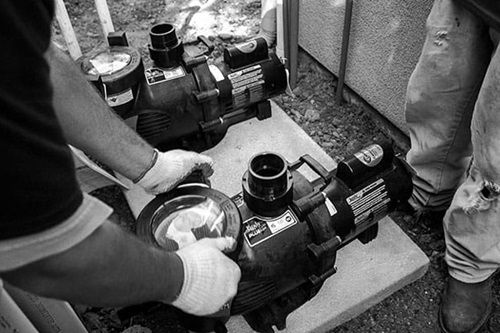Preparing Your Pool For The Freeze
- Matthew Easterly
- Jan 12, 2024
- 3 min read
Unless you live under a rock, you've heard about the arctic cold front that's set to descend upon us in a couple of days. And that means pool owners across the south will be scrambling to make sure there pool and equipment are ready for a hard freeze.
Of course, If you own a Ranch Road Pool, you're all set (every Ranch Road Pool has built-in freeze protection, so when the ambient temperature drops below 37 degrees, the pool equipment automatically turns on and doesn't turn off until the temperature gets back above 37).
But, if you're a pool owner without freeze protection, or if you lose power, or are unsure of what to do - first of all, don't panic. While it may not freeze quite that much here in Dripping Springs, folks in most of the country deal with this for months at a time - every year. So, the good news is, there's a simple set of steps to follow to make sure your pool comes through a hard freeze unscathed and ready for action when the weather warms back up.
The #1 thing to remember with pool preparation (just like with the rest of your home during a freeze) is that it all comes down to one simple principle: freezing water needs somewhere to go. Freezing water with nowhere to go is what bursts pipes, valves and casings. So, here are the two most common options for properly protecting your pool in a climate zone like ours:
Option 1: Keeping the power on (recommended).
Run your pumps. Moving water doesn't freeze as fast as still water, so running your pumps continuously when the temperature gets near freezing will create circulation to help water from freezing (here's a great physics forum discussing the reasons why) If you use you a high-speed variable pump, keep it on the highest setting.
Insulate all of your pool plumbing lines just like you would with the rest of your home. Dishtowels, blankets, deer corn bags - whatever you have readily available.
Make sure all valves are open, and that nothing is blocking flow. Keep that water moving! It's also a good practice to go ahead and backwash your pool filter before the freeze for the same reason.
Option 2: Removal/Loss of power to your pool equipment due to outages
Some people choose Option 2, especially if they know they will be out of town, or have a pool at a second home or property. At any rate, f you lose power during the freeze event, it's important to promptly take the following steps to ensure you don't sustain freeze damage to your pool and pool equipment.
Turn off all your pool equipment, both locally and at the breaker.
Drain everything that holds water. Remove the lid and the drain plugs on your pool pump. If you have a pool heater and/or a heat pump, remove those drain plugs, too. Same goes for you filter, leaf trap, etc.
Open or remove all valves (Jandy, check, etc.) that block or direct water. Remember - let that water move (And don't forget to open your pool filter's air relief valve, too)!
One last note: though it's unlikely in Central Texas that we'll have temperatures that would cause your pool surface to completely freeze over, here's a little trick we learned from some of our colleagues up in Green Bay, Wisconsin:
They float a five gallon jug partially filled with sand (so that it stays partially submerged) in the pool, and do the same thing with a 20-oz. soda bottle in their skimmer. When the surface of the pool freezes over, it protects the edges of the pool from ice damage. It works like this: instead of the ice expanding outward and wreaking havoc on the sides of your pool, the pressure instead crushes the jugs (path of least resistance -- remember: freezing water needs somewhere to go.").
There you have it. Of course, if you have any questions at all about how to prepare, or you need us to come out and help you prepare for the freeze, don't hesitate to reach out. We're always happy to help. jeremy@ranchroadpools.com



Comments